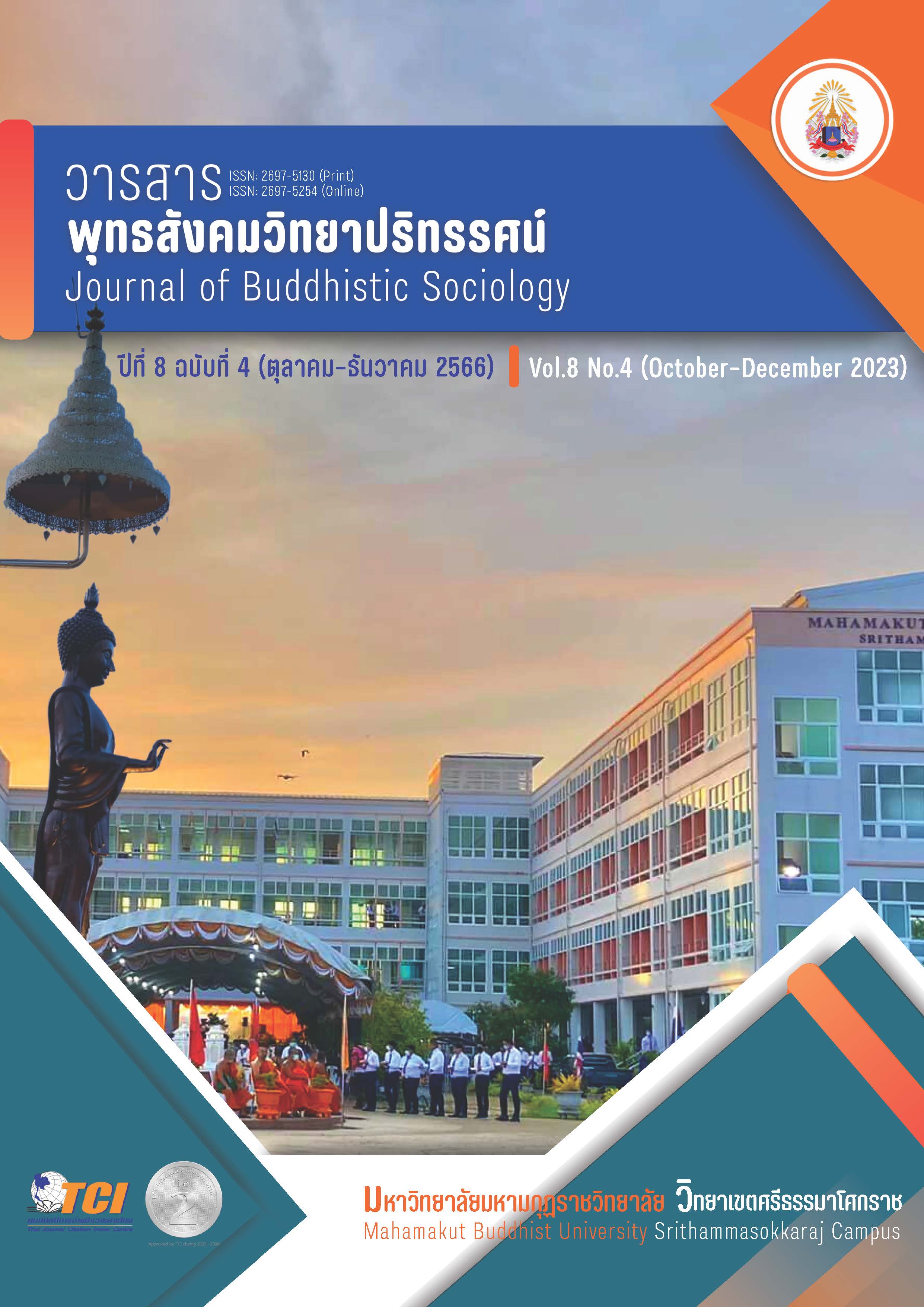การเมืองเชิงพุทธบูรณาการเพื่อประโยชน์และสันติสุขของสังคม
Main Article Content
บทคัดย่อ
แก่นแท้ของการเมืองคือการมีอิทธิพลและกำหนดทิศทางของสังคมหรือสถาบัน และสามารถครอบคลุมประเด็นต่าง ๆ มากมาย เช่น เศรษฐกิจ สวัสดิการสังคม ความสัมพันธ์ระหว่างประเทศ นโยบายสิ่งแวดล้อม และอื่น ๆ เป็นลักษณะพื้นฐานของการปฏิสัมพันธ์ของมนุษย์และมีบทบาทสำคัญในการกำหนดกฎและบรรทัดฐานที่ควบคุมพฤติกรรมของบุคคลและกลุ่มคนภายในบริบทที่กำหนด การเมืองแนวพุทธบูรณาการ เป็นการนำหลักธรรม ค่านิยม และจริยธรรมทางพุทธศาสนามารวมไว้ในแวดวงการเมือง กล่าวคือการนำคำสอนและข้อคิดทางพุทธศาสนาไปใช้เป็นแนวทางในการตัดสินใจทางการเมือง การปกครอง และการกำหนดนโยบาย แนวคิดนี้เน้นความสอดคล้องของการกระทำทางการเมืองกับอุดมคติทางพุทธศาสนา เช่น ความเมตตา การไม่ใช้ความรุนแรง จริยธรรม และสวัสดิการสังคม สิ่งสำคัญคือการบูรณาการหลักธรรมทางพุทธศาสนาเข้ากับการเมืองจะต้องพิจารณาอย่างรอบคอบถึงการแบ่งแยกระหว่างศาสนาและรัฐ เช่นเดียวกับการเคารพในความหลากหลายของความเชื่อในสังคม ความพยายามใด ๆ ที่จะรวมหลักการทางศาสนาเข้ากับการเมืองควรทำในลักษณะที่สนับสนุนหลักการของประชาธิปไตย สิทธิมนุษยชน และหลักนิติธรรม ท้ายที่สุดแล้ว ความสำเร็จของการบูรณาการหลักธรรมทางพุทธศาสนาเข้ากับการเมืองเพื่อประโยชน์และความสงบสุขของสังคมนั้นขึ้นอยู่กับความเต็มใจของผู้นำทางการเมืองและประชาชนที่จะน้อมรับค่านิยมเหล่านี้และทำงานร่วมกันเพื่อไปสู่สังคมที่มีความเมตตา ยุติธรรม และปรองดองกันมากขึ้น
Article Details

อนุญาตภายใต้เงื่อนไข Creative Commons Attribution-NonCommercial-NoDerivatives 4.0 International License.
เอกสารอ้างอิง
กรมการศาสนา. (2560). แนวทางการดำเนินงานชุมชนคุณธรรมและขับเคลื่อนด้วยพลัง “บวร”. กรุงเทพมหานคร: โรงพิมพ์มหาวิทยาลัยมหาจุฬาลงกรณราชวิทยาลัย.
ชลทิศ ธีระฐิติ. (2551). การพัฒนาทรัพยากรมนุษย์. นนทบุรี: มหาวิทยาลัยสุโขทัยธรรมาธิราช.
พระครูวินัยธรอธิษฐ์ สุวฑฺโฒ. (2564). รัฐศาสตร์แนวพุทธ: วิเคราะห์ภาวะผู้นำทางการเมืองที่พึงประสงค์. วารสารสหวิทยาการนวัตกรรมปริทรรศน์, 4(2), 70-77.
พระธรรมโกศาจารย์ (ประยูร ธมฺมจิตฺโต). (2550). ธ ทรงครองแผ่นดิน ทศพิธราชธรรม. กรุงเทพมหานคร: มหาวิทยาลัยมหาจุฬาลงกรณราชวิทยาลัย.
พระมหาเอกกวิน ปิยวีโร (อะซิ่ม) และคณะ. (2566). ความสัมพันธ์พระพุทธศาสนากับการเมืองการปกครองไทย. วารสารสังคมศาสตร์และวัฒนธรรม, 7(1), 1-13.
อรณี ฝูงวรรณลักษณ์. (2538). การเปิดรับ การคาดหวังประโยชน์และความพึงพอใจ ในรายการ ธรรมะทางสื่อโทรทัศน์ของสมาชิกชมรมทางพระพุทธศาสนาในเขตกรุงเทพมหานคร. กรุงเทพมหานคร: โรงพิมพ์จุฬาลงกรณ์มหาวิทยาลัย.


